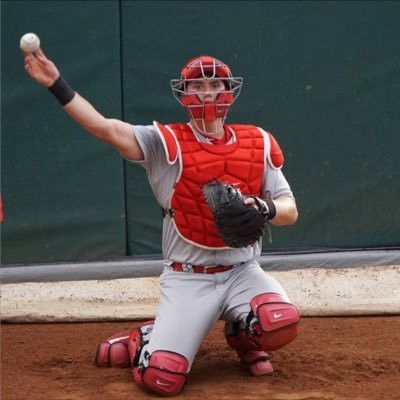
Carson Kelly
Someone had to play centerfield for the San Francisco Giants after Willie Mays. (It was Garry Maddox in 1973.) Someone had to take over third base for the Philadelphia Phillies after Mike Schmidt retired. (It was Charlie Hayes in 1989.) Soon enough, someone will have to squat behind home plate at Busch Stadium in St. Louis and assume the position occupied by Yadier Molina since Opening Day of the 2005 season. When that day arrives, the heir to the Cardinal catcher’s throne may well be Carson Kelly, currently donning the tools of ignorance for the Memphis Redbirds.
Kelly’s credentials behind the plate were established — and then some — last year when he earned a minor-league Gold Glove for his work behind the plate with Class A Palm Beach. These fielding honors (only nine of them, one for each position on the diamond) are awarded to players across all levels of the minor leagues, meaning Kelly was considered the finest-fielding backstop among those from rookie ball to Triple A. Making the honor all the more remarkable, 2015 was only Kelly’s second season as a fulltime catcher.
The 2012 draftee starred primarily as a third baseman at Westview High School in Portland, Oregon. He also played some shortstop and first base, even pitched a little. But after the 2013 season — Kelly’s first full year as a pro — Cardinal management approached him about shifting to what many consider the hardest position in team sports.
“Someone saw [catching] in me,” says Kelly. “I couldn’t find it. It was tough at the beginning, both on my body and the mental side. It was a project, in a sense. I had 51-percent of the vote, and [my coaches] had 49. My dad caught in high school and college, and was also a quarterback. It’s in my genes, the leadership and taking charge. I’m all about opportunities, taking it by the horns, and going after it.”
Hitting a baseball may be the hardest act in sports, but Kelly says he devotes at least 75 percent of his work to the defensive elements of his game. This may be the second great business decision of his young career, as the quickest way to the big leagues is excelling behind the plate. Few teams, if any, expect big offensive numbers from their catcher. But a backstop who is in control — who takes charge — of a pitching staff can make a significant impact.
“Early on, it was about having to squat three hours every night,” says Kelly, in evaluating his “project” to date. “Once I figured out how to take care of my body — the nutrition aspect of it — then it’s the mental side. Especially here in Triple-A. Every pitch, the pitch after that. Who they have coming up to hit. You’re looking over spray charts, video, where they hit in certain counts. I look at my brain as my toolbox. You take all this information and put it in the toolbox. That’s what they do in the big leagues; it’s all from your neck up.”
Alex Reyes — promoted to St. Louis last week — has pitched to Kelly for three teams over three seasons now and would love to become the Adam Wainwright to Kelly’s Yadier Molina. (Wainwright and Molina recently established a new Cardinal record for career starts by a battery.) “Carson’s made so many adjustments since he started [catching],” says Reyes. “He holds himself accountable, and he’ll hold me accountable too if he feels there’s something I need to do. That’s huge. If a catcher can’t handle a staff, he won’t have his job for too long. The way he’s worked so hard in the offseason . . . and his hitting is coming along. It’s always been fun throwing to him, the way he receives it.”
Kelly is quick to credit Cardinal manager Mike Matheny (a Gold Glove catcher during his playing days) and Molina for his rapid growth behind a catcher’s mask. He says Molina can identify the smallest details — tucking the thumb of your throwing hand to protect against foul balls for instance — that add up to a long career in shin guards and a chest protector. “I’ve gone to three big-league camps,” says Kelly, “and Yadi has always brought everything he can to help me. When he was younger, what helped him? He gets his work done, but he does a lot of teaching.”
Kelly made his Triple-A debut with the Redbirds on July 14th (his 22nd birthday) after hitting .287 in 64 games for Double-A Springfield. Through Sunday, he’s batted .293 in 21 games for Memphis. “Hitting will come,” he says. “You have to believe in yourself. I’m starting to balance the two, but keeping my defense where it needs to be.”
As his first season at the Triple-A level nears the end, Kelly recognizes how significantly close he’s come to his ultimate goal. “The pitchers have more command, a plan,” he says. “Everybody in the clubhouse has a plan, and a way they go about it. Some guys have big-league time. They know what they need to do to get back to the big leagues. The way they plan and process every bit of information . . . that’s rubbing off on me. I’m trying to get there. What do I need to do?”